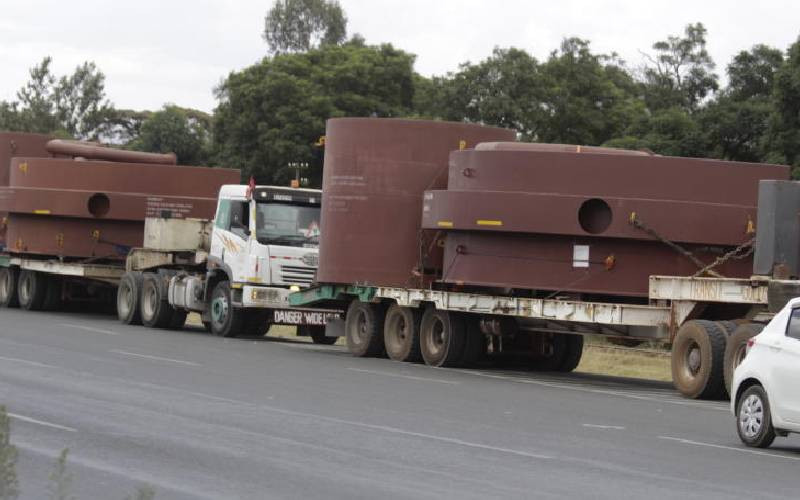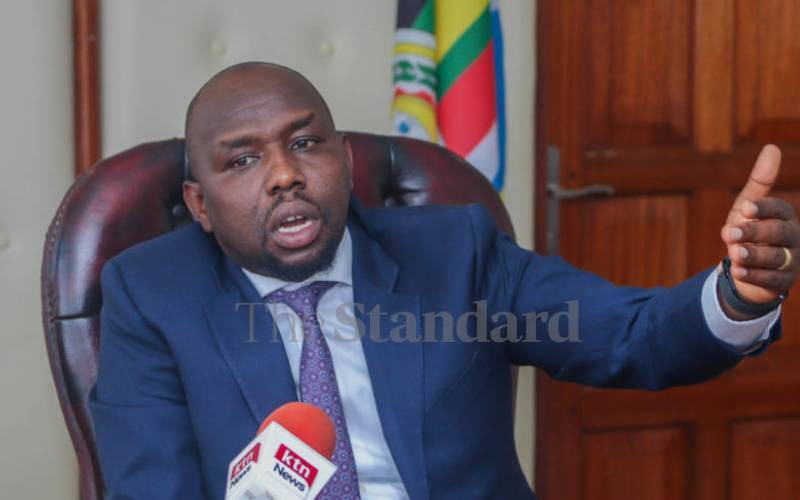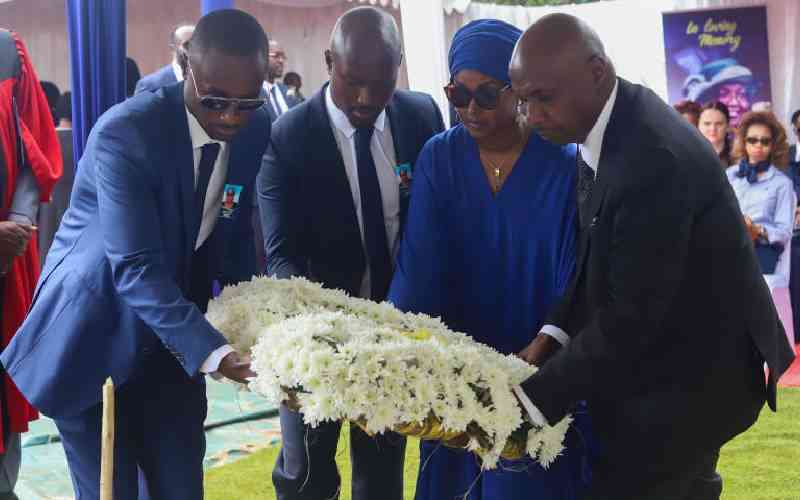By Paul Wafula
Kenya: The cost of the controversial standard gauge railway line from Mombasa to Nairobi rose by Sh107 billion between July 2012 and November last year, Business Beat has learnt.
Further, the Chinese company that was awarded the contract, China Road and Bridge Corporation (CRBC), may already have received about Sh100 billion as a first instalment, even as Parliament and the anti-corruption authority launch investigations into the project.
CRBC is a Chinese state corporation.
These details have emerged as the Government presents a justification document for the price increase, refuting claims that it would cost Kenya Sh1.3 trillion to construct the new line.
Transport Permanent Secretary Nduva Muli insists he will prove to investigating agencies that the total cost of the Nairobi to Mombasa phase of the SGR project will be Sh327 billion.
But this is Sh107 billion more than the Sh220 billion Mr Muli himself had agreed on with the Chinese firm when he awarded it the contract in July 2012.
The result of this nearly 50 per cent increase in costs is that Kenya will now pay Sh315 million to build one kilometre of the 609.3-kilometre line.
Yet, in a statement to Parliament recently, Transport and Infrastructure Cabinet Secretary Michael Kamau told legislators that the country would spend Sh247 million per kilometre, at current exchange rates.
If this first phase rate is maintained for the second phase of the project — between Nairobi to Malaba with a branch line to Kisumu — then Kenyans will have to part with about Sh250 billion more.
The total length of the SGR line is about 1,250km.
Consequences
Investigations by Business Beat into the contract award revealed a rushed process that failed to give Kenya the benefit of competitive bidding that could have presented a cheaper deal.
A source who understands how the deal was negotiated revealed that Kenya did not have an alternative but to accept the terms of the contract after it failed to convince the World Bank to fund the project.
“China does not allow its state corporations to compete among each other. CRBC was the one that scouted for the project, and the fact that it did the feasibility study gave it an edge,” he said.
Stay informed. Subscribe to our newsletter
It took slightly over one month to approve the railway project proposal from the Chinese company.
Documents show that CRBC submitted its proposal to Kenya Railways for the construction of the first phase of the SGR line on May 29, 2012. It was handed the contract on July 10 the same year.
The main correspondent on the contract award was Muli, who was the then Kenya Railways’ MD. Mr Li Qiang, CRBC Kenya’s general manager, was the contact person for the Chinese firm.
The award
The award letter was received by CRBC at their offices in Lavington on the day it was signed, and accepted unconditionally, with the Chinese firm agreeing to do the project for Sh220 billion.
A week later, a nine-member team was set up to discuss the finer details of the deal; and the additional costs began to pile up over considerations of terrain, the quality of materials to be used and the required approvals.
Kenya Railways was represented by Mr Solomon Ouna, who was also the chair, Mr Alfred Matheka, Mr David Mwadali, Ms Marianne Kitany and Mr Stanley Gitari.
The minutes of the negotiations show that Mr Yang Jie was the team leader for China Roads, assisted by Mr Xiong Shi Ling, Mr Mo Yong Nian and Mr Zhou Yi Hua.
Another piece of the puzzle in the project is why the same Chinese company that was handed the contract had earlier offered to carry out the feasibility study and preliminary design of the first phase of the SGR project for free — a conflict of interest.
The Government allowed CRBC to undertake the study on August 12, 2009.
It has since emerged that CRBC has been contracted to construct only the first phase of the project, between Mombasa and Nairobi.
“We have not yet awarded the contract for the second phase, which is between Nairobi and Malaba. We will be looking for a new financier and the tender is still open,” Muli said.
But this will do little to quiet the businessmen and brokers who have come out fighting after losing out in the latest round of adjustments to the original contract that have worked in the Chinese contractor’s favour.
For instance, though the initial agreement limited the firm to civil works on the line, the Government has ceded more ground and allowed CRBC to source for rolling stock — the locomotives, passenger coaches and freight wagons — adding an extra Sh95 billion in costs.
The financiers
According to a schedule of payments seen by Business Beat, 30 per cent of the contract price was due to CRBC a month from the date the contract was effected.
This happened before November last year when President Uhuru Kenyatta led three heads of state from the East African region to officially launch the project in Mombasa.
Muli did not confirm or deny if the money had been paid out, but he said the Government would adhere to the terms of the contract.
It also appears that the financiers of the project have reduced the grace period by half, from 10 years to five. This means that Kenyans will start repaying the loan much earlier than anticipated.
“Exim Bank [of China] will finance 85 per cent of the project, and we will raise the rest,” Muli said.
The loan will attract a 2 per cent interest above the London Interbank Offered Rate, commonly known as the Libor.
Libor is the average interest rate leading banks in London estimate they would be charged if borrowing from other banks.
The Libor rate is projected to be at above 2 per cent in 2017, when the loan is due. This means that Kenya will pay at least 4 per cent in interest per year.
This translates to at least Sh1.3 billion per month if the loan is repaid in 30 years.
The start of repayments is planned to coincide with the completion of the first phase of the project.
As per the contractual terms, Exim Bank and the Government must have already released about Sh98.1 billion, at current exchange rates.
Another 10 per cent of the project cost will be due for payment within one month after Kenya Railways issues a letter of commencement. This is expected to happen before April.
The Government also gave Exim Bank a guarantee that the railway line would have at least 35 per cent of the cargo business from the Mombasa Port.
This is likely to drive Rift Valley Railways (RVR), which won a 25-year concession to operate the railway, out of business.
[email protected]
 The Standard Group Plc is a
multi-media organization with investments in media platforms spanning newspaper
print operations, television, radio broadcasting, digital and online services. The
Standard Group is recognized as a leading multi-media house in Kenya with a key
influence in matters of national and international interest.
The Standard Group Plc is a
multi-media organization with investments in media platforms spanning newspaper
print operations, television, radio broadcasting, digital and online services. The
Standard Group is recognized as a leading multi-media house in Kenya with a key
influence in matters of national and international interest.
 The Standard Group Plc is a
multi-media organization with investments in media platforms spanning newspaper
print operations, television, radio broadcasting, digital and online services. The
Standard Group is recognized as a leading multi-media house in Kenya with a key
influence in matters of national and international interest.
The Standard Group Plc is a
multi-media organization with investments in media platforms spanning newspaper
print operations, television, radio broadcasting, digital and online services. The
Standard Group is recognized as a leading multi-media house in Kenya with a key
influence in matters of national and international interest.









